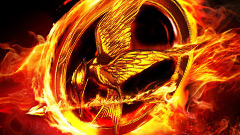March 28, 2012 by Vinnie Leduc

To find out what all the hype was all about from my family and friends, I decided to read the book before watching the movie, so a lot of what I say here will naturally be a comparison of the two and more of an evaluation of how effective the adaptation is (that’s my official pseudo-spoiler warning). As I read, I often wondered how the hell are they going to portray this and that in the movie, but for the most part I’d have to say they did a great job. Not perfect or even excellent, but not bad at all. It’s always a difficult task condensing and staying true to immensely popular subject material all while being sure not to royally piss off an already established and potentially rabid fan base.
The movie retains the spirit and most of the emotional impact and social commentary, but for a more complete and satisfying experience, read the book. Like Ron Howard’s adaptation of Angels and Demons (don’t get me started on the blasphemous Da Vinci Code), the film doesn’t come close to matching the book in violence or suspense. But even though I knew what was going to happen at certain parts as I watched The Hunger Games, I’ll admit that I still teared up at pivotal scenes, so I must give proper credit to the moviemakers.

Last seen in a supporting role in X-Men: First Class, the surprising Marvel prequel that was ultimately honored in several of our Best of 2011 lists, Oscar nominee Jennifer Lawrence solely headlines a blockbuster film for the first time in her young career. Excluded from our selections of most anticipated movies of 2012, The Hunger Games and Lawrence now have surely caught the world’s eye after an appetizing but not particularly salivating trailer. She reportedly beat out 30 other actresses in auditioning for the role, and she deserved it. I wouldn’t go so far as to say she’ll score a nomination at the end of the year, but Lawrence was legit. The only other candidates I could imagine as Katniss are maybe Emily Browning (especially after Sucker Punch) and Chloë Grace Moretz.
Josh Hutcherson, last seen in Journey 2, breaks out of family fare as Peeta. Oscar nominees Woody Harrelson and Stanley Tucci were top-notch casting choices. Mostly everybody is, and that’s saying something coming from somebody who read the book. The rest of the cast includes Elizabeth Banks, Lenny Kravitz, Donald Sutherland, and Wes Bentley. The latter two capitalize on additional parts not found in the novel. These behind-the-scenes bits, along with other extra details like seeing the gambling odds for the tributes, epitomize the advantage of presenting the narrative via film.
However, a significant amount of what makes the book so powerful has been understandably lost or diluted. I’m okay with some of the changes, like the origin of the mockingjay pin (who cares?) and District 11’s reaction to Rue (that one actually makes the film better), but the compressed story, especially of the competition itself, compromises what you’d gain from the book in knowing exactly what Katniss’ inner thoughts and conflicts are. It also makes much of the actual games’ events seem arbitrarily conceived. Much of the story is about survival, not just the titular contest but also getting by in the poorer districts. Viewers who haven’t read the book will only get a few hints at the true struggle and hardships that Katniss experiences both before and during the massacre.

The Hunger Games, about teenagers slaughtering and hunting one another, could easily have been rated R (please gimme unrated version, please gimme unrated version…), but aside from the violence, the critical relationship between Katniss and Peeta and the love triangle set-up for the sequels suffer the most. Thankfully it never descends to the ridiculous level of Twilight, but it sometimes starts to get dangerously close.
After over two hours of sitting in a theater, I can see why the ending may be a bit rushed, but they dropped the ball here, especially if they intend to adapt the remaining novels of the literary trilogy, which I’m sure they will now that it’s broken several records and become the year’s biggest blockbuster so far. The ominous sense of unknown further consequences, which makes you want to pick up the next book immediately, is minimized in the movie. But most of that is excusable. Director Gary Ross’ two previous directing efforts, Pleasantville and Seabiscuit (how’d he land The Hunger Games after those very different movies?), were nominated for multiple Academy Awards, and I wouldn’t be surprised if his latest film scores some nods, too. The Hunger Games gets 4 out of 5 stars or B+ or Great.














